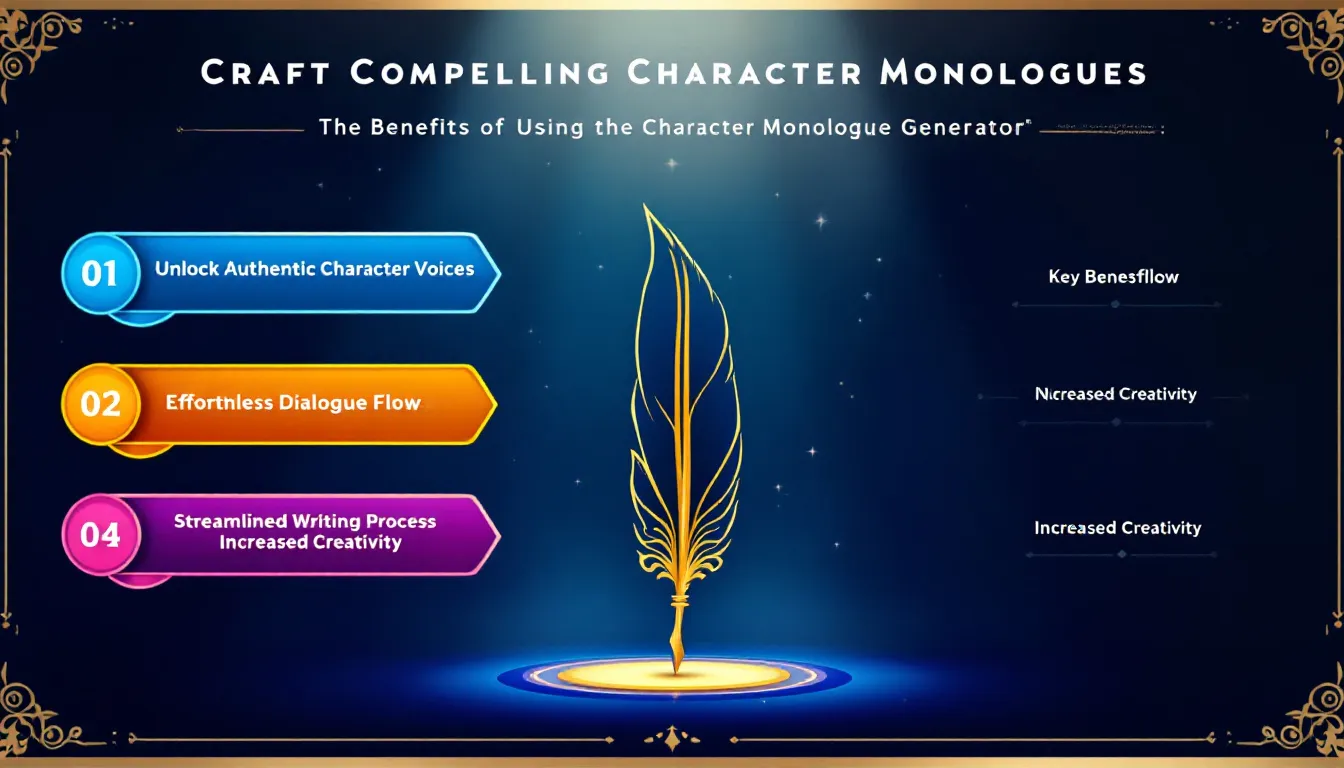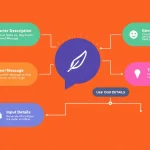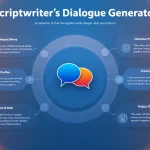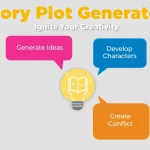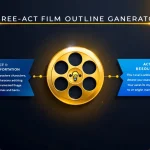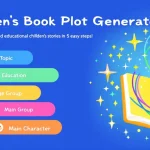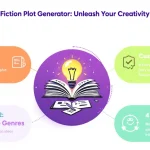Is this tool helpful?
How to Use the Character Monologue Generator Effectively
This Character Monologue Generator helps you craft expressive, personalized monologues for your characters. To get the best results, carefully fill out the form fields with clear, detailed information. Here’s how to use each input effectively:
-
Character: Enter the character’s name along with a brief description that captures their identity or role. For example:
“Elena, a rebellious teenager fighting for freedom” or “Marcus, a war-weary veteran haunted by memories”. -
Situation: Describe the specific moment or circumstance the character faces. Examples include:
“Confronting a difficult truth about her family” or “Preparing to lead a final mission behind enemy lines”. -
Primary Emotion: Specify the dominant emotion the character feels in this moment. Try phrases like:
“Quiet determination” or “Overwhelming regret”. -
Character Background (Optional): Add details about the character’s history, personality, or setting to enhance authenticity. Examples:
“Elena grew up in a small coastal town and has always challenged authority.”
“Marcus served in the army for ten years before returning home.” -
Story Context (Optional): Explain the broader plot or narrative surrounding the character. Examples:
“Elena’s fight is part of a larger rebellion against a harsh regime.”
“Marcus’s mission impacts the fate of his entire unit and country.”
Once you complete the required fields, click “Generate Monologue.” The tool will create a unique monologue that reflects your character’s voice, situation, and emotions. Use this as a foundation for your writing or performance.
What Is the Character Monologue Generator and Why Use It?
The Character Monologue Generator is a writing aid designed to inspire and assist writers, actors, and creatives in producing impactful monologues. It turns your input about a character’s identity, emotions, and context into a rich, character-driven monologue. By focusing on emotional depth and narrative relevance, the tool helps you:
- Discover authentic character voices tailored to specific situations
- Overcome writer’s block by delivering fresh, creative content
- Save time with a ready-made starting point for further refinement
- Explore emotional complexity and motivations in a structured way
- Adapt monologues for diverse genres, including drama, fantasy, and more
This generator is especially useful when you want a thoughtful monologue that captures your character’s feelings and dilemmas in a way that feels real and relevant to your story.
Practical Applications of the Character Monologue Generator
You can apply this tool across many creative fields. Here are some common ways the monologue generator supports your work:
1. Playwriting and Theatre
Develop vivid, emotionally charged monologues for stage plays. For instance, a playwright writing about a revolutionary leader might input:
- Character: Ava, a passionate activist leading a city uprising
- Situation: Rallying her followers before a major protest
- Emotion: Fierce hope mixed with anxiety
2. Screenwriting for Film and TV
Create compelling inner monologues or moments of reflection for characters on screen. Imagine a suspense thriller with:
- Character: Detective Leo Ward, unraveling a complicated case
- Situation: Facing a moral dilemma between justice and loyalty
- Emotion: Conflicted determination
3. Novel and Short Story Writing
Use generated monologues to deepen your characters’ internal voice in narrative fiction. For example:
- Character: Priya, an introverted artist struggling with self-doubt
- Situation: Preparing for her first gallery show
- Emotion: Nervous excitement
4. Actor Preparation
Practice and explore character motivations with personalized monologues. Actors can rehearse emotional range and authenticity by assuming:
- Character: John, a retiree haunted by lost opportunities
- Situation: Reflecting on life choices at a crossroads
- Emotion: Quiet regret
5. Teaching and Writing Exercises
Educators can assign monologue generation as a tool to study character development and emotional depth. Example prompt:
- Character: Lila, a futuristic explorer arriving on a new planet
- Situation: Experiencing awe and uncertainty during first encounter
- Emotion: Wonder mixed with apprehension
Benefits of Using the Character Monologue Generator
Save Time and Overcome Writer’s Block
The tool provides instant inspiration, helping you move past creative hurdles and jumpstart your writing process.
Enhance Character Voice Authenticity
Supplying detailed character information ensures the generated monologues sound unique, realistic, and true to your character’s persona.
Ensure Emotional Depth and Relevance
Focusing on a primary emotion and story context enriches the monologue’s emotional resonance and narrative fit.
Versatile for Multiple Writing Genres
Adapt the tool for drama, fantasy, sci-fi, romance, or any genre by entering relevant contextual information about your character and story.
Learning Aid for Writers and Actors
Use the generator to study how character background, situation, and emotion influence voice and tone in monologue writing.
Common Questions About the Character Monologue Generator
Can I use the generated monologues verbatim in my work?
These monologues serve best as creative starting points. Customize and refine the text to match your character’s voice and your story’s style.
How long are the monologues?
Monologues generally range from 150 to 300 words, providing enough substance for depth while allowing you room to expand or condense as needed.
Is the tool suitable for historical or real-life figures?
Yes, but remember the output is fictional and should not be taken as factual. Treat it as creative interpretation or inspiration.
How can I make the monologues unique to my characters?
Add detailed background and story context, then personalize the output by adapting language, tone, and specific references to your character’s experiences.
Does the generator work for all genres?
Yes. Providing detailed, genre-specific information helps generate fitting and authentic monologues in any style or setting.
Can I create monologues in languages other than English?
The output is optimized for English. You can input information in other languages, but the generated monologue will be in English, which you can then translate or adapt.
How often should I use the tool during writing?
Use it whenever you need fresh ideas or want to explore your character’s voice. Some writers find it helpful at initial character development, others when they face writer’s block.
Can it generate dialogues between multiple characters?
The tool focuses on single-character monologues. To create dialogues, generate separate monologues for each character and combine them yourself.
How do I align monologues with a specific time period?
Include era-specific details in the background and story context. After generation, tweak wording and references to match the time period accurately.
Is this tool beginner-friendly?
Yes, it guides you to think about character, situation, and emotion clearly, making it a useful learning aid for beginners developing monologue writing skills.
Important Disclaimer
The calculations, results, and content provided by our tools are not guaranteed to be accurate, complete, or reliable. Users are responsible for verifying and interpreting the results. Our content and tools may contain errors, biases, or inconsistencies. Do not enter personal data, sensitive information, or personally identifiable information in our web forms or tools. Such data entry violates our terms of service and may result in unauthorized disclosure to third parties. We reserve the right to save inputs and outputs from our tools for the purposes of error debugging, bias identification, and performance improvement. External companies providing AI models used in our tools may also save and process data in accordance with their own policies. By using our tools, you consent to this data collection and processing. We reserve the right to limit the usage of our tools based on current usability factors.
